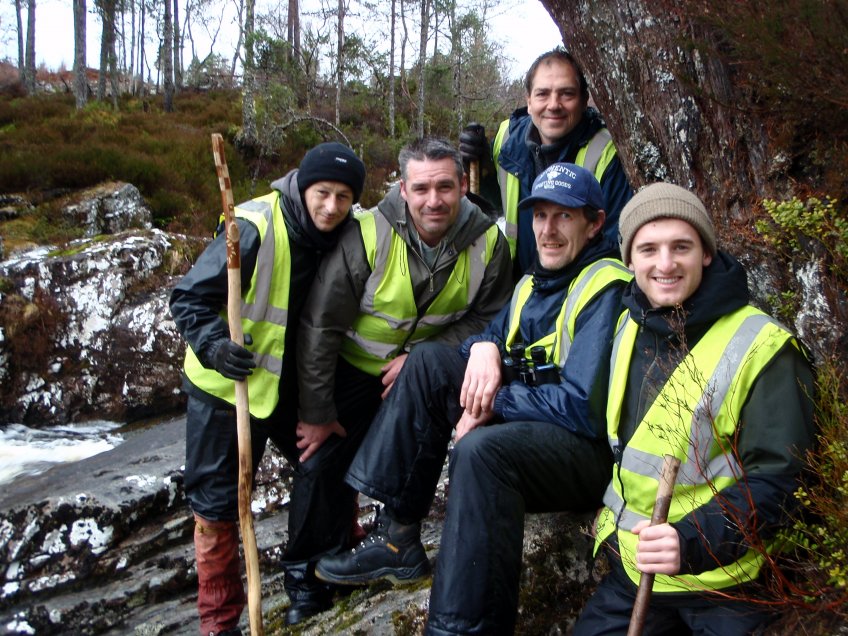Helping nature, helping ourselves
I go to nature to be soothed and healed, and to have my senses put in order.
John Burroughs
 In April 2016 a group of HARP participants travelled up to the Caledonian Forest and in many instances to Scotland for the first time, to come on a Conservation Week at Trees for Life’s Dundreggan Conservation Estate. HARP is the independent charity in Southend-on-Sea reducing homelessness by providing essential services, emergency housing and long-term solutions which enable people to live independently in the area. HARP residents undertook a week of ecological restoration work by planting saplings and learning about the importance of the Caledonian Forest’s delicate ecosystems, removing non-native trees on the Estate, and carrying out surveys in nearby woodlands to search for red squirrels.
In April 2016 a group of HARP participants travelled up to the Caledonian Forest and in many instances to Scotland for the first time, to come on a Conservation Week at Trees for Life’s Dundreggan Conservation Estate. HARP is the independent charity in Southend-on-Sea reducing homelessness by providing essential services, emergency housing and long-term solutions which enable people to live independently in the area. HARP residents undertook a week of ecological restoration work by planting saplings and learning about the importance of the Caledonian Forest’s delicate ecosystems, removing non-native trees on the Estate, and carrying out surveys in nearby woodlands to search for red squirrels.
HARP’s involvement with Trees for Life began back in 2009, with groups returning each year since, and participants and staff alike have been quick to praise the many benefits felt during their Conservation Weeks. One participant commented: “My expectation of a week away from Southend in the remote destination of the Highlands was one where I would have the opportunity to reflect on my life without distraction and to make plans to re-build my future. The week exceeded my expectations in every respect, and I couldn’t have dreamt of the beauty or tranquility of the surroundings, nor how beneficial it would be in my recovery. The week will forever stay in my memory, as will the experiences I shared with new-found friends”.
Countless poems have been written of the states of awe we experience when immersed in nature. William Wordsworth’s poetry is famous for communicating his sense that nature is filled with what he called ‘a motion and a spirit which rolls through all thinking things, and all objects of thought.’
In recent years, health care providers have begun to recognise the therapeutic attributes of nature for treating varying conditions, from attention disorders to depression. Over the last decade, a large amount of research has been carried out into the effects of regular contact with nature. These benefits include positive impacts on physical health, emotional wellbeing and enhanced personal and social skills, and natural spaces and surroundings are coming to be acknowledged as the essential ingredient.
Nathan Dodds, a HARP support worker said that this year’s group, some of which a year prior had been living on the streets, took a tremendous amount from their time at Dundreggan: “each one of them had an experience of a lifetime and have carried what they learnt not only about themselves but the nature around them back to their lives at home. Most of the group are dealing with substance addictions and a week away in the Scottish Highlands was a therapeutic time away. Giving something back to nature did a world of good to their recovery and everyone found a new level of motivation.” Many of the group intend to return to the Highlands once they have completed their programme with HARP as they all believe that the week at Trees for Life had provided a tangible benefit to their lives, Nathan added.
Collaborations such as HARP and Trees for Life have recognised this regular need to experience, enjoy, learn and benefit from contact with the natural environment. With the simple act of planting a tree, participants were able to heal not only part of the landscape but part of themselves as well.

